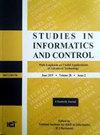Novel NSGA-II and SPEA2 Algorithms for Bi-Objective Inventory Optimization
IF 1.1
4区 计算机科学
Q4 AUTOMATION & CONTROL SYSTEMS
引用次数: 0
Abstract
: Inventory optimization is a significant problem that is tied directly to financial gains. Its complexity has led to the development of new inventory models and optimization techniques. Evolutionary algorithms, particularly Pareto based evolutionary algorithms have been proven to be reliable for solving such problems. However, these evolutionary algorithms concentrate mostly on global search and have limited local search abilities. This leads to a poor convergence to the Pareto front. Among these algorithms the most studied are non-dominated sorting genetic algorithm-II and strength Pareto evolutionary algorithm2. This paper proposes a novel method that increases their convergence. The novelty is based on three techniques: Firstly, a time-based fitness assignment that favours solutions from previous generations is employed. Secondly, before the crossover process, the mating pool is updated with a positive bias towards better solutions. Finally, a more disruptive mutation scheme is used to prevent premature convergence. The novel algorithms were tested on a benchmark problem suite and two inventory problems. The performance of the algorithms is measured using hypervolume, generational distance and spacing metrics. The results illustrated by graphics indicate that the novel algorithms can obtain better convergence without increasing the time complexity.用于双目标库存优化的NSGA-II和SPEA2新算法
:库存优化是一个与财务收益直接相关的重大问题。其复杂性导致了新库存模型和优化技术的发展。进化算法,特别是基于Pareto的进化算法已被证明对于解决此类问题是可靠的。然而,这些进化算法主要集中于全局搜索,并且具有有限的局部搜索能力。这导致帕累托前沿的收敛性较差。在这些算法中,研究最多的是非支配排序遗传算法II和强度Pareto进化算法2。本文提出了一种新的方法来提高它们的收敛性。这种新颖性基于三种技术:首先,采用了有利于前几代解决方案的基于时间的适应度分配。其次,在交叉过程之前,对交配池进行更新,使其偏向于更好的解决方案。最后,使用更具破坏性的突变方案来防止过早收敛。新算法在一个基准问题集和两个库存问题上进行了测试。算法的性能是使用超容量、世代距离和间距度量来衡量的。图形结果表明,新算法在不增加时间复杂度的情况下可以获得更好的收敛性。
本文章由计算机程序翻译,如有差异,请以英文原文为准。
求助全文
约1分钟内获得全文
求助全文
来源期刊

Studies in Informatics and Control
AUTOMATION & CONTROL SYSTEMS-OPERATIONS RESEARCH & MANAGEMENT SCIENCE
CiteScore
2.70
自引率
25.00%
发文量
34
审稿时长
>12 weeks
期刊介绍:
Studies in Informatics and Control journal provides important perspectives on topics relevant to Information Technology, with an emphasis on useful applications in the most important areas of IT.
This journal is aimed at advanced practitioners and researchers in the field of IT and welcomes original contributions from scholars and professionals worldwide.
SIC is published both in print and online by the National Institute for R&D in Informatics, ICI Bucharest. Abstracts, full text and graphics of all articles in the online version of SIC are identical to the print version of the Journal.
 求助内容:
求助内容: 应助结果提醒方式:
应助结果提醒方式:


